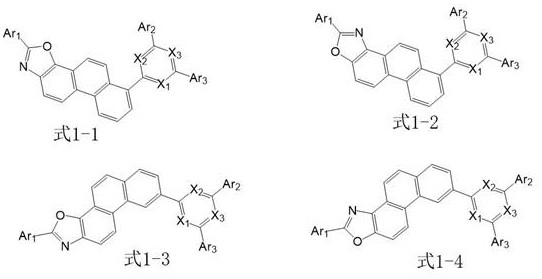Host material and organic light-emitting device comprising same
A host material and host technology, applied in the field of organic electroluminescent devices, can solve the problems of lack of materials and achieve high luminous efficiency
- Summary
- Abstract
- Description
- Claims
- Application Information
AI Technical Summary
Problems solved by technology
Method used
Image
Examples
Embodiment 1
[0045] Embodiment 1: the synthesis of compound 1-18
[0046] (1) Synthesis of intermediate 1-1-2
[0047]
[0048] Compound 1-18-2 (7.9g, 23.7mmol), 1-18-1 (6.53g, 21.6mmol), tetrakis (triphenylphosphine) palladium (1.2g, 1.0mmol), potassium carbonate (7.5g, 59 mmol), 90 mL of toluene, 30 mL of ethanol, and 30 mL of distilled water were added to the reaction vessel, and the reaction was stirred at 120° C. for 4 hours. After the reaction was complete, methanol was added dropwise to the mixture, and the resulting solid was filtered. The resulting solid was recrystallized and purified by column chromatography to obtain compound 1-18-3 (5.4 g, yield: 53%). LC-MS: M / Z 469.13 (M + ).
[0049] 2) Synthesis of compound 1-18
[0050] Compound A (10.1g, 23.7mmol), 1-18-3 (10.2g, 21.6mmol), tetrakis (triphenylphosphine) palladium (1.2g, 1.0mmol), potassium carbonate (7.5g, 59mmol), 90mL Toluene, 30 mL of ethanol, and 30 mL of distilled water were added to the reaction vessel, an...
Embodiment 2
[0051] Embodiment 2: the synthesis of compound 1-39
[0052]
[0053] Compound 1-39 was synthesized with reference to the method of Example 1, and the synthesis of compound 1-18 was referred to for other steps to obtain compound 1-39 (8.9 g, yield: 67%). LC-MS: M / Z616.19 (M + ).
Embodiment 3
[0054] Embodiment 3: the synthesis of compound 2-83
[0055]
[0056] Compound 2-83 was synthesized with reference to the method of Example 1, and the synthesis of compound 1-18 was referred to for other steps to obtain compound 2-83 (11.1 g, yield: 63%). LC-MS: M / Z817.28 (M + ).
PUM
 Login to View More
Login to View More Abstract
Description
Claims
Application Information
 Login to View More
Login to View More - Generate Ideas
- Intellectual Property
- Life Sciences
- Materials
- Tech Scout
- Unparalleled Data Quality
- Higher Quality Content
- 60% Fewer Hallucinations
Browse by: Latest US Patents, China's latest patents, Technical Efficacy Thesaurus, Application Domain, Technology Topic, Popular Technical Reports.
© 2025 PatSnap. All rights reserved.Legal|Privacy policy|Modern Slavery Act Transparency Statement|Sitemap|About US| Contact US: help@patsnap.com



